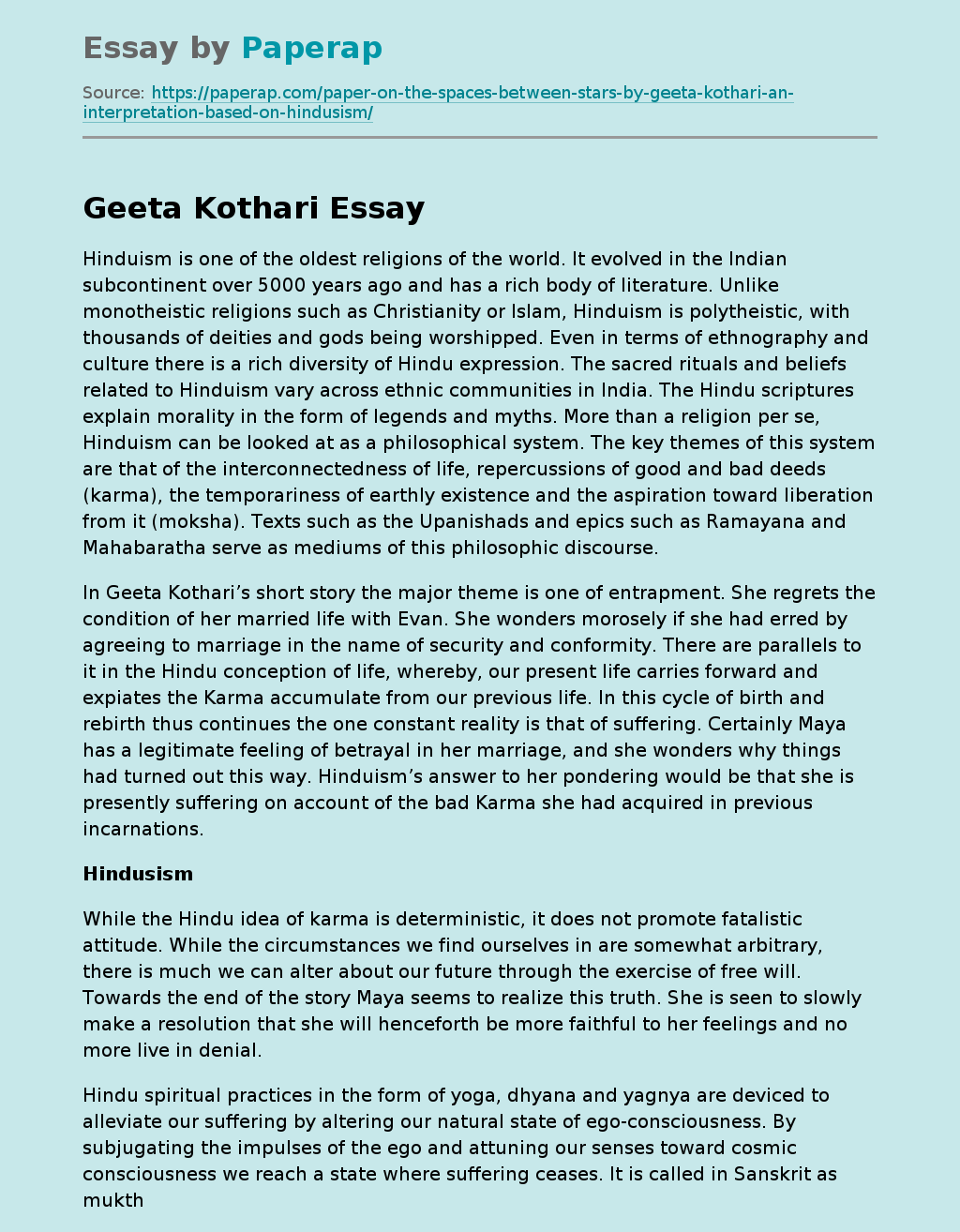Hinduism is one of the oldest religions of the world. It evolved in the Indian subcontinent over 5000 years ago and has a rich body of literature. Unlike monotheistic religions such as Christianity or Islam, Hinduism is polytheistic, with thousands of deities and gods being worshipped. Even in terms of ethnography and culture there is a rich diversity of Hindu expression. The sacred rituals and beliefs related to Hinduism vary across ethnic communities in India. The Hindu scriptures explain morality in the form of legends and myths.
More than a religion per se, Hinduism can be looked at as a philosophical system. The key themes of this system are that of the interconnectedness of life, repercussions of good and bad deeds (karma), the temporariness of earthly existence and the aspiration toward liberation from it (moksha). Texts such as the Upanishads and epics such as Ramayana and Mahabaratha serve as mediums of this philosophic discourse.
In Geeta Kothari’s short story the major theme is one of entrapment.
She regrets the condition of her married life with Evan. She wonders morosely if she had erred by agreeing to marriage in the name of security and conformity. There are parallels to it in the Hindu conception of life, whereby, our present life carries forward and expiates the Karma accumulate from our previous life. In this cycle of birth and rebirth thus continues the one constant reality is that of suffering. Certainly Maya has a legitimate feeling of betrayal in her marriage, and she wonders why things had turned out this way.
Hinduism’s answer to her pondering would be that she is presently suffering on account of the bad Karma she had acquired in previous incarnations.
Hindusism
While the Hindu idea of karma is deterministic, it does not promote fatalistic attitude. While the circumstances we find ourselves in are somewhat arbitrary, there is much we can alter about our future through the exercise of free will. Towards the end of the story Maya seems to realize this truth. She is seen to slowly make a resolution that she will henceforth be more faithful to her feelings and no more live in denial.
Hindu spiritual practices in the form of yoga, dhyana and yagnya are deviced to alleviate our suffering by altering our natural state of ego-consciousness. By subjugating the impulses of the ego and attuning our senses toward cosmic consciousness we reach a state where suffering ceases. It is called in Sanskrit as mukthi. Maya’s project of self-actualization is not articulated in such esoteric Hindu philosophic terms. But hers is a project of great import in the context of the constricting and adversarial reality her marriage has turned out to be.
In my own experience I’ve faced issues of melancholy in the past. In the early days, I used to feel very let down and feel victimized. But slowly I realized that remorse and helplessness lead us nowhere. I then started undergoing an attitudinal change in two aspects. First I trained myself to accept difficulties as part of life. Second I trained myself to proactively mitigate adversities. As a result I can claim that I am a much happier person now than I was a few years back. The important thing is that my circumstances have not drastically changed but my outlook and behaviour has changed. And it has made a world of difference. In this regard I share the same spirit of Maya. Between me and her, we share the Hindu philosophic outlook to addressing problems, although it took us both some time to make this transition.
Hinduism is one of the oldest religions of the world. It evolved in the Indian subcontinent over 5000 years ago and has a rich body of literature. Unlike monotheistic religions such as Christianity or Islam, Hinduism is polytheistic, with thousands of deities and gods being worshipped. Even in terms of ethnography and culture there is a rich diversity of Hindu expression. The sacred rituals and beliefs related to Hinduism vary across ethnic communities in India. The Hindu scriptures explain morality in the form of legends and myths. More than a religion per se, Hinduism can be looked at as a philosophical system. The key themes of this system are that of the interconnectedness of life, repercussions of good and bad deeds (karma), the temporariness of earthly existence and the aspiration toward liberation from it (moksha). Texts such as the Upanishads and epics such as Ramayana and Mahabaratha serve as mediums of this philosophic discourse.
In Geeta Kothari’s short story the .
Age-old Hinduism and its Rich Literature. (2019, Dec 05). Retrieved from https://paperap.com/paper-on-the-spaces-between-stars-by-geeta-kothari-an-interpretation-based-on-hindusism/

